Top 15 Applications Written in Python
May 18, 2023 • 5284 Views • 15 min read
Tetiana Stoyko
CTO & Co-Founder
Python deservedly is considered one of the most popular, famous, and user-friendly open-source programming languages in the world.
It is hard to overestimate the significance and the overall role of Python in the world of custom software development.
For instance, it is one of the most basic coding languages, which is extremely easy to learn and, probably, has already become a must-have knowledge for any developer.
It also has one of the biggest and strongest software communities, which additionally increases the usability and possible use cases for this technology.
Besides, there is a wide range of different variations of this technology, each of which is adjusted and modified for very specific purposes.
In other words, it is hard to imagine a case, when it is impossible to use Python during the software development process. Still, it doesn’t mean, that it should be used instead of other high-level programming languages.
Sometimes other frameworks or libraries can be a better solution for specific functionality.
For illustration, let’s consider all the potential pros and cons of using Python for your software project, as well as look at a few cases, which will help us to better understand what are the best possible conditions for Python development services.
What is Special About Python?
As we said before, it is hard to find a software engineer, who hasn’t ever heard of this popular programming language.
To make it easier for all of us, let’s just create a brief list of the advantages and drawbacks of using Python for your software product.
Python Features
Once again, it is super easy.
For example, more experienced developers regularly recommend that beginners learn Python, regardless of the further specification they are interested in, like frontend, backend, full-stack, etc.
As a result, it is very easy to find a team extension for almost any Python project.
Thanks to the ease of learning, Python allows students to concentrate more on the overall programming logic, instead of trying to memorize all the syntax specifics of the programming language.
So, Python can be used not only as an all-in-one development solution but a sample of how the coding actually works, and what logic it is driven by, i.e. in the role of beginner guidebook for newcomers.
Additionally, it is definitely an unlimited toolset for any desired use purpose. For instance, it is beloved software in the field of various science projects.
SciPy is one of the most famous and well-spread standard libraries, commonly used for complex calculations, machine learning, artificial intelligence, or any other scientific and technical computing.
Besides, Python software product development services can be an even easier task thanks to numerous variations of this versatile programming language, which are similar to others like Jython (a combination of Python and Java), IronPython (Python +.NET), etc.
Why not Build Apps with Python?
The first thing, that comes to mind is that it is by far not the best solution for building apps with Python when it comes to scalable and complex enterprise applications due to the numerous disadvantages of this programming language.
For instance, it is a very slow coding language, compared to its alternatives. So, if you require a fast and highly scalable app, then you should look for other alternatives such as Node.js over Python.
Additionally, apps made with Python won’t support multithreading.
Thus, they will also work slower than those, driven by alternative programming languages because they will work in a task-by-task routine, instead of proceeding with multiple threats at once.
Among other potential weaknesses of apps, written in Python, are high memory consumption, and struggle with cross-platform development as well.
Nevertheless, all the foregoing doesn’t mean, that it is impossible to say, that apps written in Python have no place in the modern software development industry.
To prove this point, let’s find out what apps use Python today.
Python Applications Examples
To make it more structured, let’s consider real-world Python use cases by industries.
Python Web Development
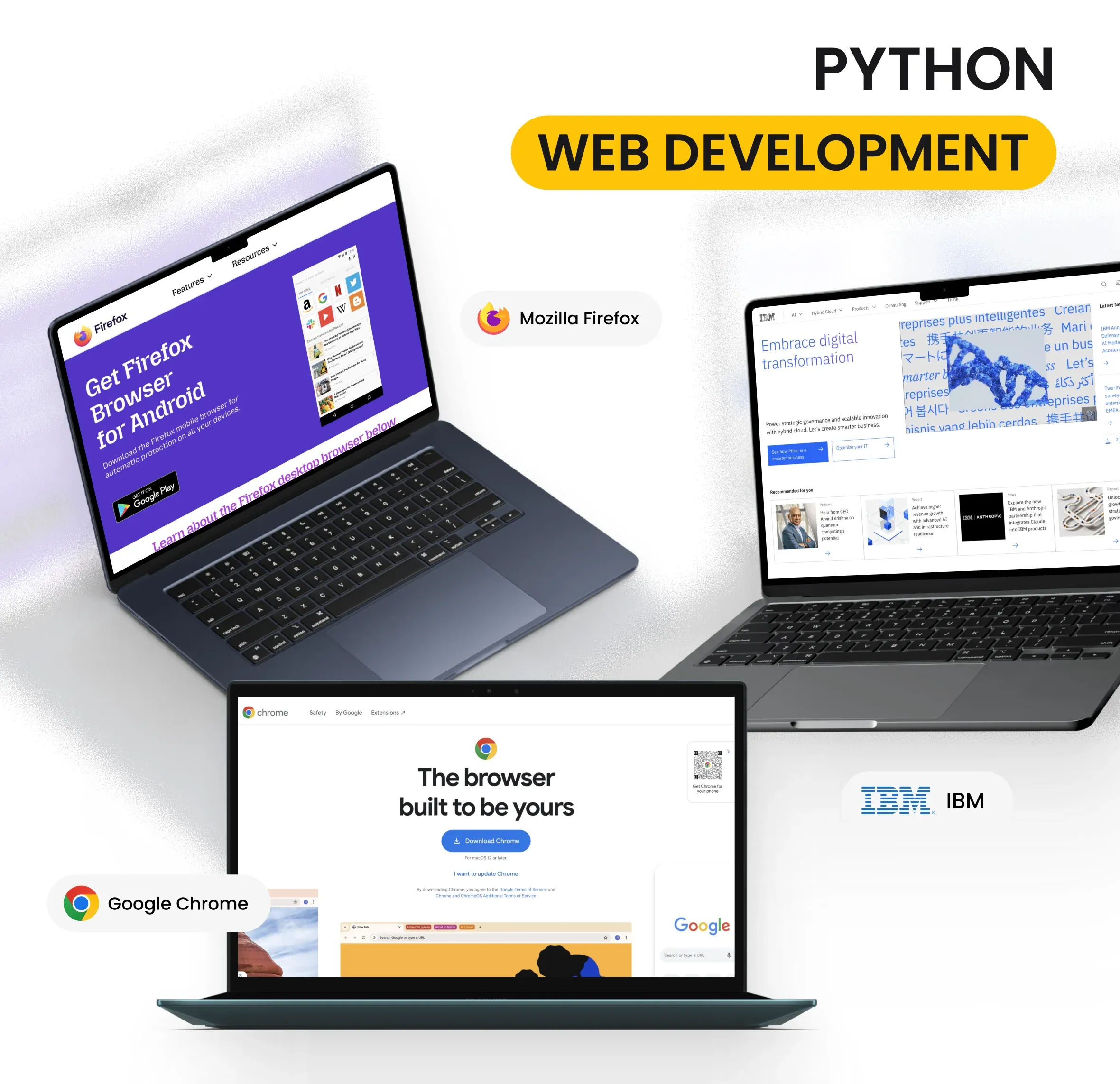
Thanks to the plurality of various Python-friendly tools and various content management systems, it become a very important software solution for developing various web platforms.
- IBM is one such real-world Python use case. Knowing the context of this tech company, like the fact, that it is one of the biggest tech giants in the modern market, it is possible to count it as a potential argument for using Python for application development.
- Mozilla Firefox, a well-known internet browser is also a great example of an application, driven by Python. At the very beginning, this coding language was not a part of the apps’ tech stack. However, sometime after, the development team decided to switch from PHP to a combination of Python and Django. As a result, recent versions of Mozilla are significantly different from the first ones, due to the impact of Python itself and Python-based instruments.
- Google is yet another browsing Python applications example, which shows that some complex and scalable apps written in Python are capable of showing great results despite all the potential criticism.
Social Media Networks Written in Python
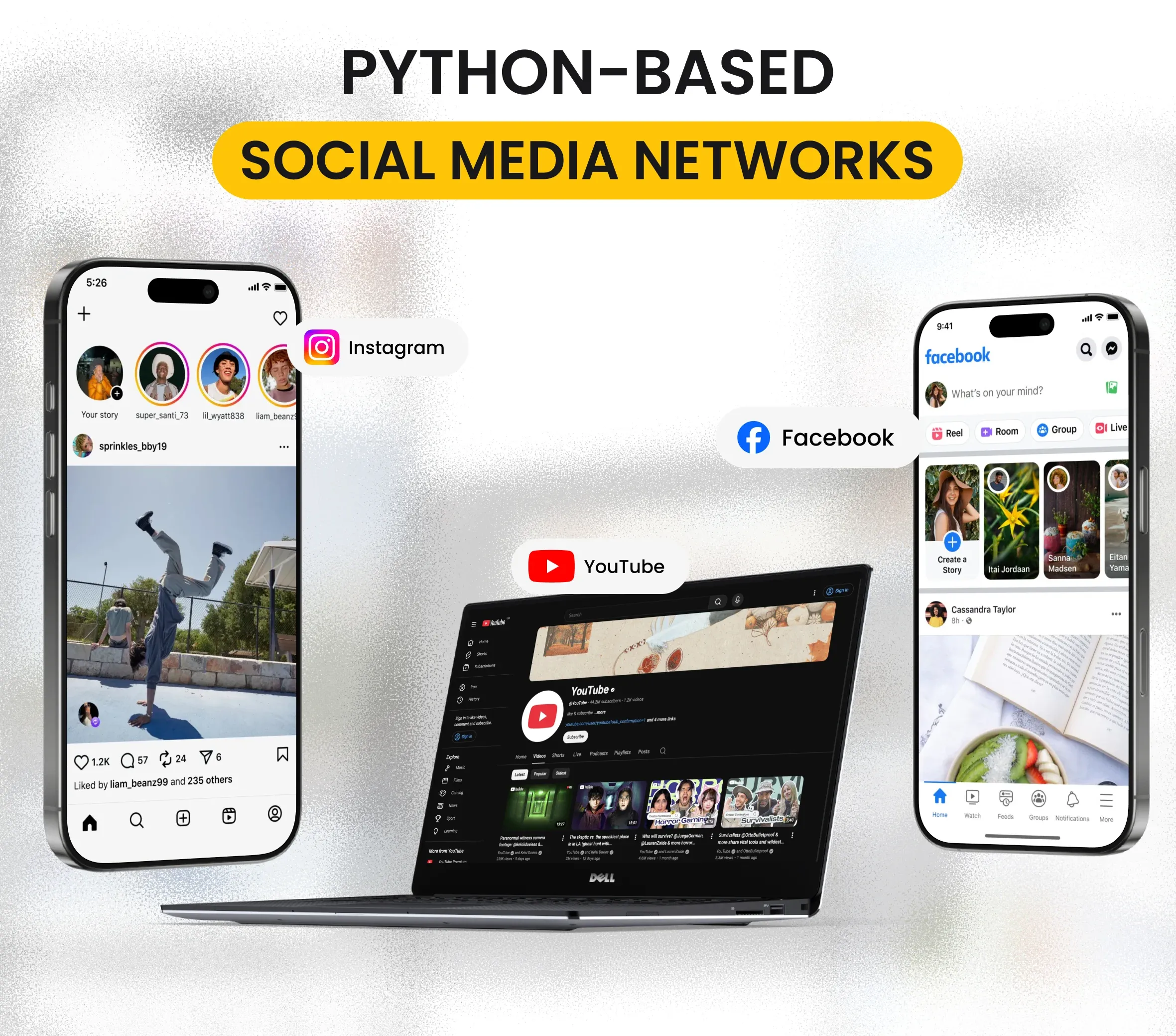
Surprisingly, Python is also used in a number of different social networks. Truth be told, it is mainly used not in a “row” format, i.e. programming language itself.
Instead, some Python-based software solutions or a range of libraries are used for developing such types of popular applications.
- Instagram. This is one of the most well-known social media networks for now, and it utilizes the Django framework under the hood. Thanks to the nature of this framework, it become a powerful tool for various database-driven web application development, which allows software developers to facilitate great numbers of UI elements and manage them in a user-friendly manner.
- YouTube was almost fully written in pure Python. So, we can also assume, that even pure Python programming language can show incredible performance results in terms of web development, depending on the experience of the software development team.
- Facebook. This giant social network is another example of a successful Python implementation. As a matter of fact, Facebook is a very complex application, which is rather a combination of different programming languages and other software solutions, than a combination of a few main lines of code. Yet, this is probably the reason for using Python: it is an extremely customizable and combination-friendly language.
Science Apps Made with Python
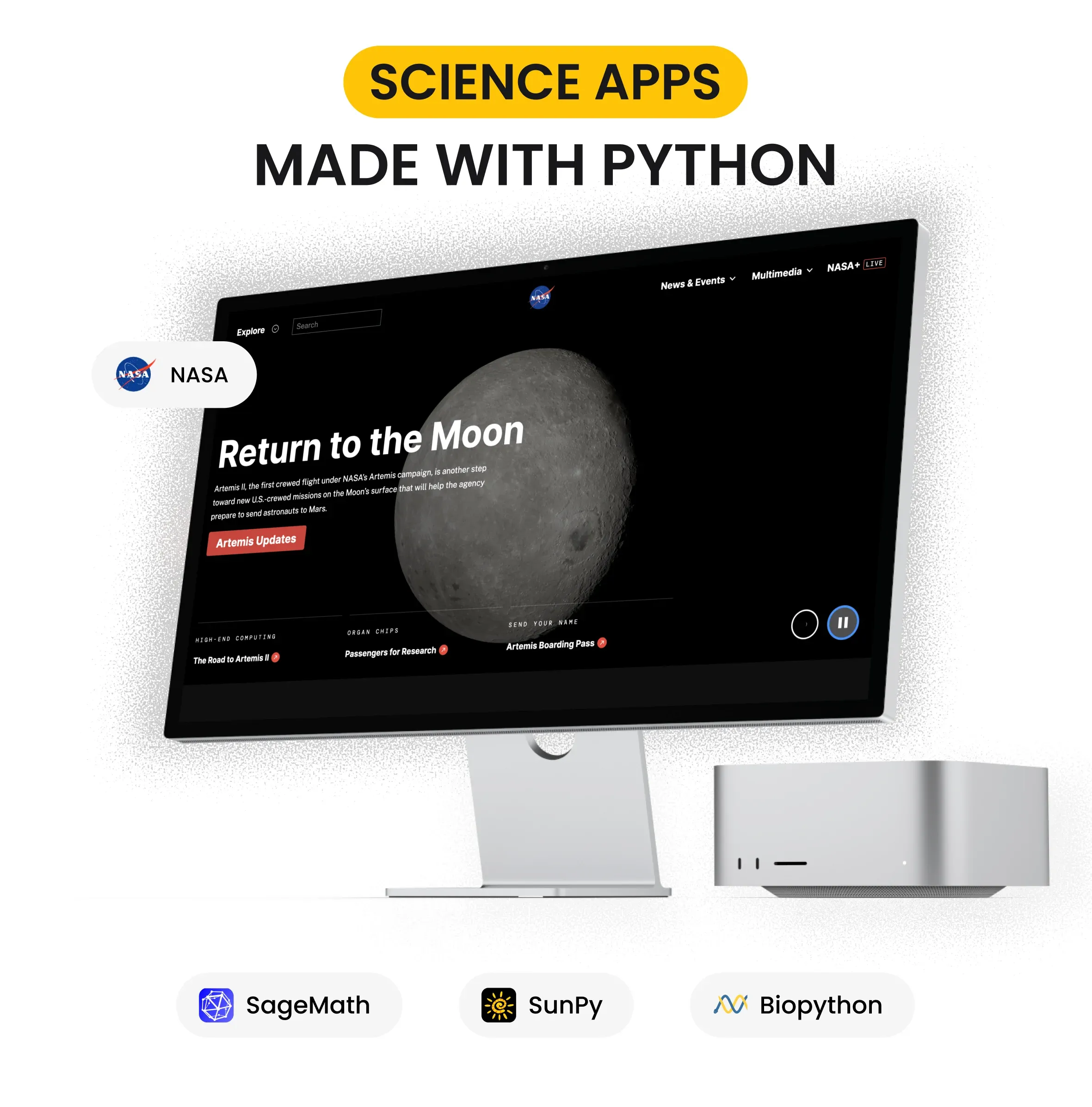
As was said before, Python is one of the most popular solutions in the scientific field.
Thus, it is used not only for application development but also in the role of internal software within an app or a system, designed for very specific purposes.
- NASA is one of the most common examples of building apps with Python. Actually, it is hard to name all the Python use cases in this organization.
Yet, recently NASA admitted that they are related to the development of SunPy, a project, which aims to create an open-source solar analysis Python environment.
Plainly speaking, it is hard to create a detailed list of full-fledged scientific applications written in Python, because most such specific Python software solutions propose their functionality in standalone tools.
For example, SageMath, Biopython, or others.
Python SaaS Solutions
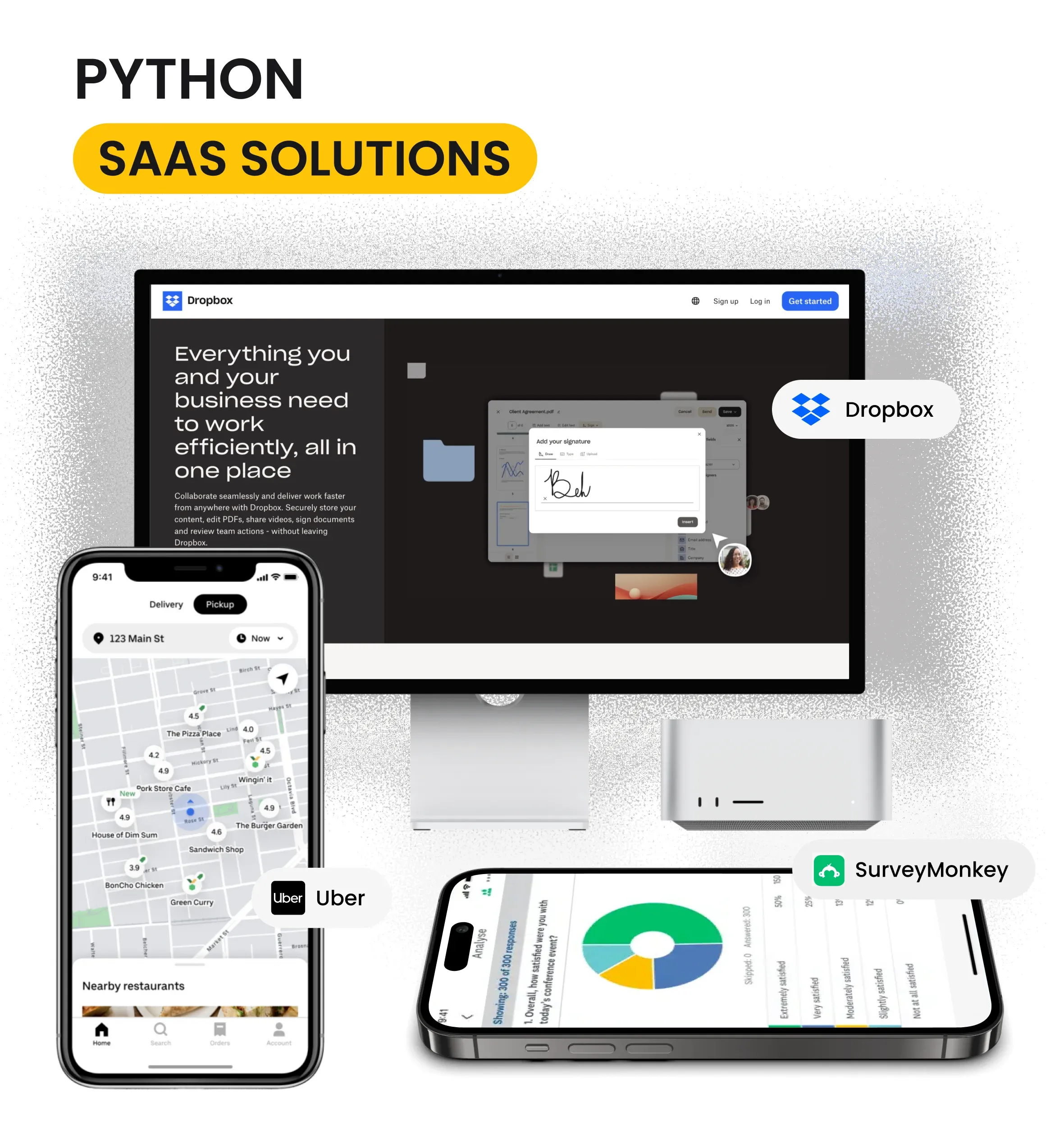
Sofware-as-a-Service is also a popular field for apps made with Python, or using this programming language for other software solutions.
The list of SaaS apps written in Python should undoubtedly include:
- DropBox, a popular cloud services provider, proposes file sharing, synchronization, and storing.
- Uber, a successful company, specialized in proposing taxi services, and other logistics solutions like Uber Freight.
- SurveyMonkey is a web-based platform for creating, sharing, and analyzing online surveys and various forms.
Game Apps Made with Python
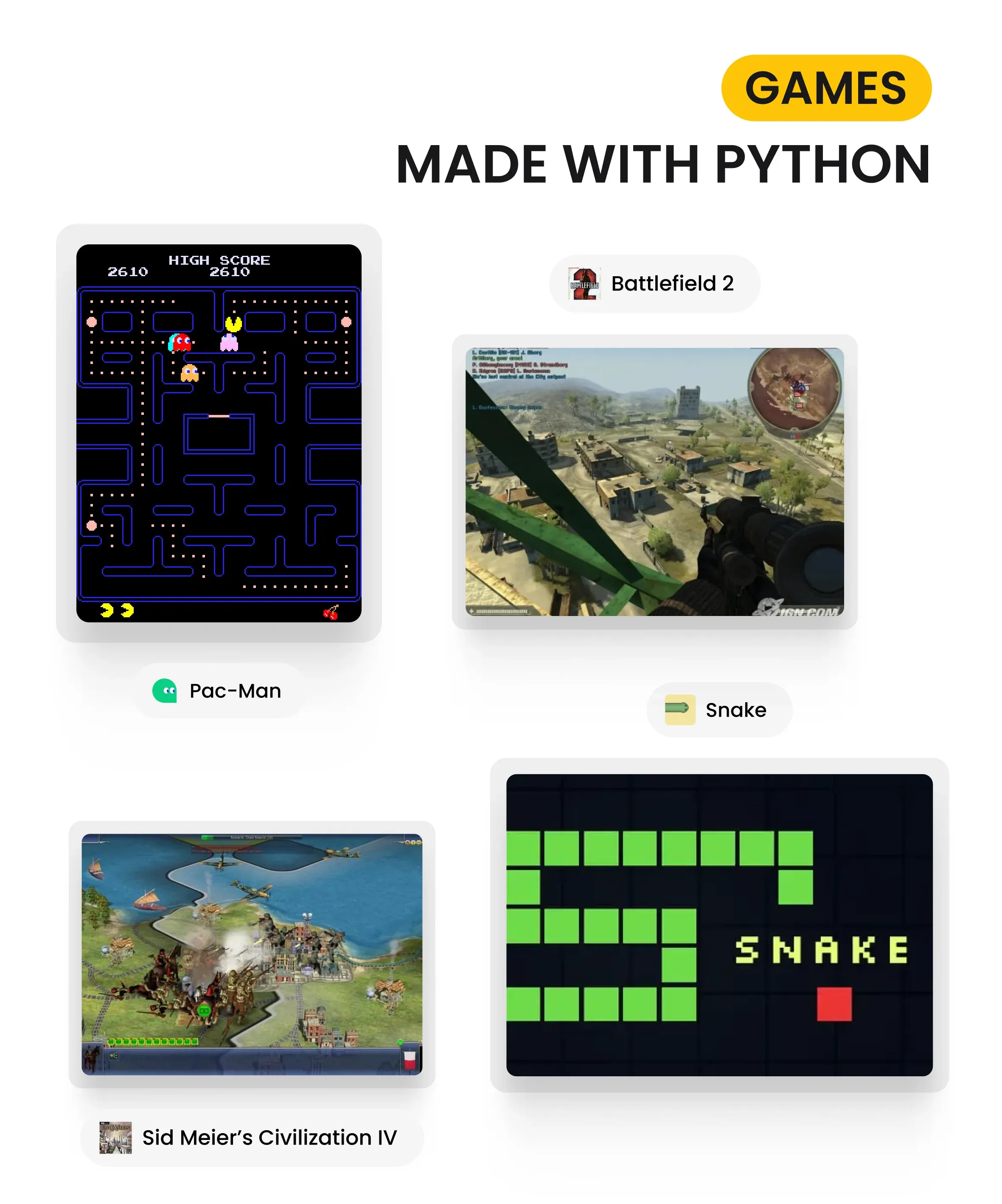
Python programming languages support the creation of simple games like Snake or Pac-Man.
In order to increase the possibilities to use this programming language for game development purposes, as well as to add extra tools, the PyGame software solution appeared.
Apart from taking part in porting legendary and popular games to new platforms, Python has a few great application examples in the GameDev industry:
- Battlefield 2, was a first-person shooter video game. Python was used for various calculations and lists management like scoreboards, or balancing the opposite teams.
- Sid Meier’s Civilization IV, a very popular turn-based strategy game. Developers used Python to improve various mechanics, based on calculation. For instance, to improve the AI of computer players.
End Line
Summing up all the above, it is hard to overestimate the importance of real-world Python use cases.
This programming language has a wide range of possible use purposes and is deservedly considered one of the most customizable and modified programming languages.
Yet, it would be a manipulation, if we said, that the foregoing list is proof that building apps with Python is always an ideal choice.
Just to clarify, most of the aforementioned Python application examples were developed some time ago, when there were no other efficient alternative technologies, worth considering.
Obviously, today the overall situation has significantly changed, and the IT industry proposes countless other great technologies, which can be used for application development.
To cut a long story short, there is a variety of useful software tools, and in order to gain the maximum of these technologies, it is worth considering all the available resources, not only the famous and popular ones.
So, before hiring a Python developer, it is better to understand what apps use Python and all the advantages of this programming language.
One of the best approaches to do so - is to examine case studies or directly contact a software development company to discuss your ideas, estimate the future project, and choose the most suited Tech Stack.
What’s your impression after reading this?
Love it!
4
Valuable
1
Exciting
2
Unsatisfied
3
FAQ
Let us address your doubts and clarify key points from the article for better understanding.
What frameworks are available for building web applications with Python?
Python has several popular web frameworks, such as Django, Flask, and Pyramid. These frameworks provide the necessary tools and libraries to simplify web development tasks.
What tools do I need to build Python apps?
To build Python apps, you'll need a text editor or an integrated development environment (IDE) like PyCharm, Visual Studio Code, or Atom. You'll also need to have Python installed on your computer, which you can download from the official Python website.
Can I build cross-platform desktop applications with Python?
Yes, you can! There are libraries like PyQT and Tkinter that allow you to build desktop applications that can run on multiple operating systems, such as Windows, macOS, and Linux.
Are there any mobile app development frameworks for Python?
Yes, there are frameworks like Kivy and BeeWare that allow you to build mobile applications using Python. These frameworks use native components and provide a way to package and distribute your app for different mobile platforms.
Is Python suitable for building large-scale applications?
Python can be used for building large-scale applications, but it may not be the most performant choice for certain scenarios. However, Python's ease of use and extensive library support make it a popular choice for prototyping and building the initial versions of applications.
Can I integrate databases with Python apps?
Yes, Python provides libraries and modules to interact with various databases. Popular options include SQLite, MySQL, PostgreSQL, and MongoDB. You can use libraries like SQLAlchemy or Django's ORM (Object-Relational Mapping) to work with databases efficiently.
YOU MAY ALSO LIKE
Let's talk!
This site uses cookies to improve your user experience. Read our Privacy Policy
Accept


Share this article